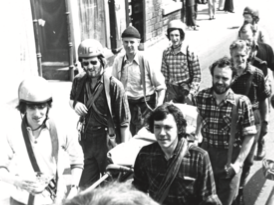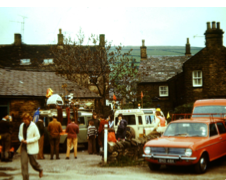Well this is certainly an auspicious year for the team; 50 years ago the team was created through the amalgamation of the Sett Valley Mountain Rescue Team and the Goyt Search and Rescue Team – Kinder MRT (KMRT – not to be confused with Keswick MRT or Kintail MRT) is believed to be the only mountain rescue team named after a mountain and not a valley, town or region.
Anyone who has spent much time on Kinder has seen the remains of the aircraft that have crashed on the mountain – from the Liberator to the Sabres. Most of these crashes occurred in the second world war. In response to this terrible loss of life the RAF established rescue teams. These were all volunteers, all servicemen and usually stationed near to the mountains such as Harpur Hill in Buxton who were the nearest team to Kinder.
There was an obvious need for a mountain rescue team of stable volunteers who could be called upon when needed, not just for RAF incidents but also to assist civilian walkers and climbers. In response the New Mills Mountain Rescue Team was set up in 1959. Call outs nowadays are by text message but in 1959 a knock on the door was notice of an incident.
Once out on the hill communications were also limited. Car headlamps, rocket flares and even bell ringing was used to signal teams.
In 1964 three scouts died in the Four Inns Walk tragedy. This demonstrated the need for a larger, more co-ordinated rescue response; this was achieved by bringing together all the local rescue teams under the single banner of the Peak District Mountain Rescue Organisation (PDMRO) which organises and controls operations. One key thing about mountain rescue is that whilst each team has its own primary operating area, the secondary operating area is the rest of the UK.
In the Peak District, this means that if one team needs extra manpower for an operation, they will call out other teams, as recent call-outs have demonstrated. The same applies to any team outside the Peak District.
The following is an excerpt from “Kinder Mountain Rescue Team: A Short History” by Dr Peter Andrew:
The mass trespass may have happened in 1932 but it was the access agreements coupled with the inexorable rise of the car that led to an increase in people enjoying their right to roam – hill walking and rock climbing in the Peak District.
Hayfield, where KMRT is based, was easily accessible by bus, train and car.
Since the 1930s the Mountain Rescue Committee (MRC, now MREW – Mountain Rescue England & Wales) had been setting up Mountain Rescue Posts. It was 1950 before Kinder got its very own comprised of a stretcher, casualty bag (like a very heavy duty sleeping bag) and a basic first aid kit that resided at Tunstead House, Reservoir House and finally the Filter House.
This equipment was nearly always used by ad-hoc groups of people recruited by the post supervisor and local policeman from members of the victim’s party, people on the crag or moor and other climbers and walkers in nearby climbing club huts, hotels, pubs and hostels immediately after an accident… The problem in Hayfield was that, unlike the Lake District and North Wales, there were no climbing club huts, hotels or hostels catering for climbers and walkers – they all went home by train, bus or car each evening. The local policeman had to rely on his knowledge of local residents who knew the way over Kinder when an accident occurred or a person was reported missing on the hill.
Peter was elected chairman of the PDMRO in January 1967 and in the early 1970’s, under Peter’s guiding hand the PDMRO structure was reviewed and changes put in place to reflect the current and future needs of the service. Peter steered and guided the mountain rescue service through many years, which saw major changes in both the constitution and construction of mountain rescue in England and Wales.
In 1996 Peter was awarded the MBE in recognition of his services to mountain rescue in England and Wales; Peter died in 2000, whilst walking in the Peak District, but his legacy lives on – mountain rescue continues to strive forward based firmly on strong foundations laid by such men as PJA.
In November 2001, Peter was posthumously awarded the Certificate of Distinguished Service by the Mountain Rescue Council.
Since its humble beginnings, mountain rescue has seen some significant changes including a huge transformation from a thoroughly amateur, yet utterly committed, voluntary service to what can only be described as an incredibly professional organisation. Equipment and resources have advanced in leaps and bounds as have the demands on mountain rescue teams; no longer just responding to incidents ‘on the hill’, MRTs are now increasingly called upon by the Police Service to assist in lowland/urban searches for missing/vulnerable people to assist in local and national flood events such as occurred in 2015 (and are likely to occur more frequently in future), helping to search water courses or recover bodies from water, to assist the Ambulance Service reach injured people in difficult-to-access locations.
And all of this is provided by unpaid volunteers who give up their free time to train, attend call-outs and carry out the ever-increasing increasing administrative tasks necessary to keep the team operational and, more critically, safe. For this, we owe a huge debt to our families for their patience, understanding and support.
Unlike our counterparts in Europe and beyond, mountain rescue in the UK is provided free of charge at the point of need, 24/7/365; funding is principally through public donations and bequests, without which we could not continue to operate. So, what better time to say thank you to each and every one of you who has given us a donation or supported us in any other way. We wish you all a very happy New Year and our very best wishes for happy and healthy 2021.
Below are a few images from the archive, some old and some a bit more recent … enjoy:





.jpg)
.jpg)
.jpg)
.jpg)
